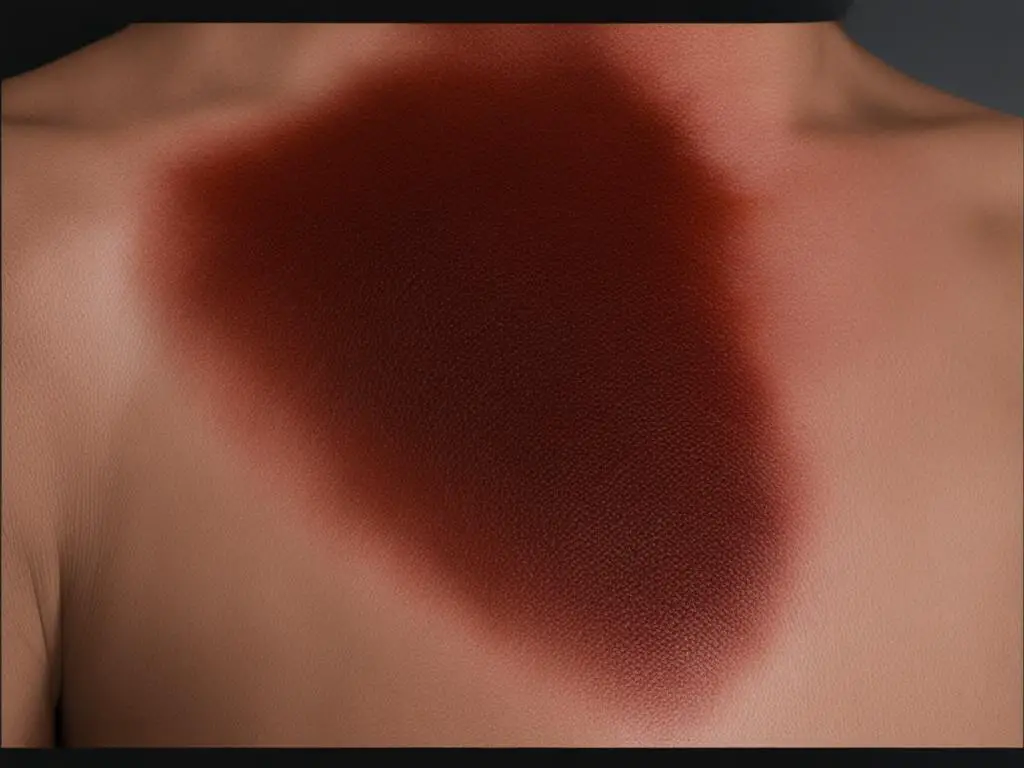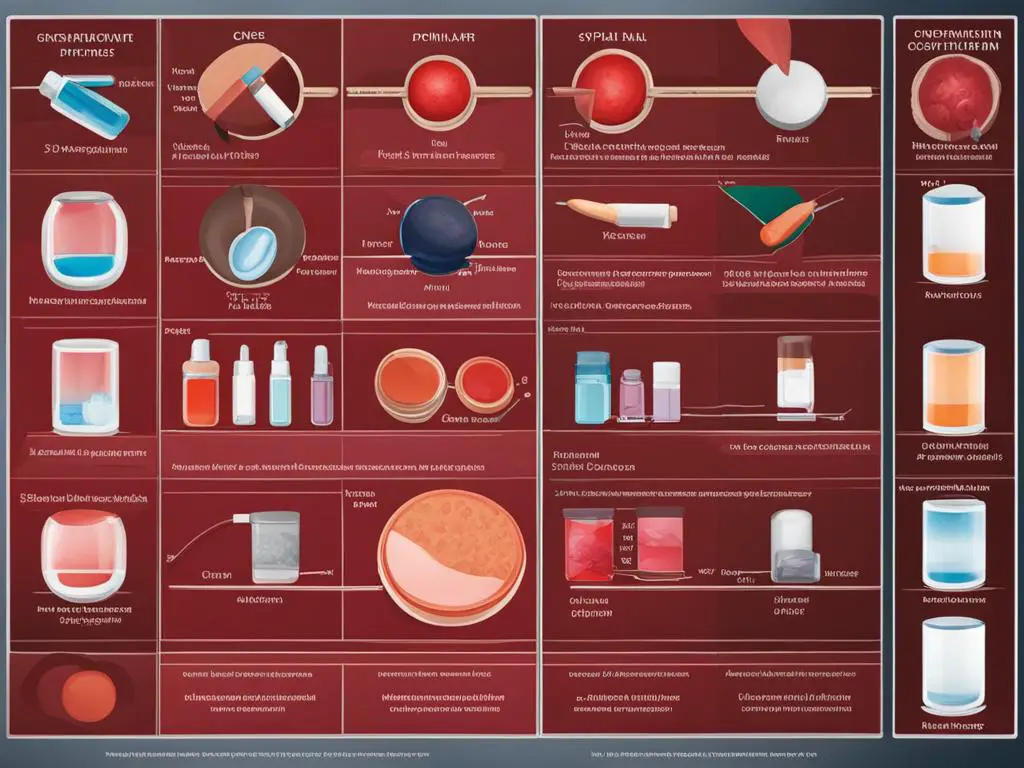Sexually transmitted diseases (STDs) are an unfortunate reality for many people. Two common conditions that can affect the genital area are syphilis and ingrown hair. While they can have similar symptoms, it is crucial to understand the key differences between them to receive proper diagnosis and treatment.
In this article, we will compare the symptoms of syphilis vs ingrown hair and discuss the risks and treatment options for each condition.
It is important to note that if you are experiencing concerning symptoms, you should seek medical attention immediately.
Key Takeaways:
- STDs like syphilis and ingrown hair can have similar symptoms but require different treatments.
- Recognizing the signs of each condition can help you seek appropriate medical care.
- If left untreated, both syphilis and ingrown hair can lead to complications.
- Effective treatment options are available for each condition.
- If you experience concerning symptoms, consult a healthcare professional for accurate diagnosis and guidance.
Syphilis Symptoms
Syphilis is a serious sexually transmitted disease caused by the bacteria Treponema pallidum. The bacteria can enter the body through minor cuts or abrasions on the skin during sexual contact with an infected person. The symptoms of syphilis can occur in stages and often mimic other sexually transmitted infections. Early symptoms of syphilis may not always be noticeable, making regular testing essential for people who are sexually active.
The most common symptom of syphilis is a small, painless sore or ulcer known as a chancre that appears in the genital area. This sore can heal on its own, but without treatment, the disease can spread to other parts of the body, including the brain and nervous system.

- Red or pink rash on the skin, often on the palms and soles of the feet
- Small skin growths or wart-like sores in the genital area
- Flu-like symptoms, such as fever, headache, muscle aches, and fatigue
- Sore throat and swollen lymph nodes
- Difficulty coordinating muscle movements
If left untreated, syphilis can cause serious health problems, including damage to the heart, brain, and other organs. Therefore, if you experience any of these symptoms and suspect that you may have syphilis, it is essential to seek medical attention immediately.
Ingrown Hair Symptoms
Ingrown hairs occur when a hair grows back into the skin, causing inflammation, irritation, and pain. When they appear in the genital area, ingrown hairs can be mistaken for other skin infections. Therefore, being aware of specific symptoms can help differentiate between an ingrown hair and a more severe condition.
The most common symptoms of ingrown hair include:
- Red bumps: Ingrown hairs are often marked by small, red bumps that may become inflamed or infected.
- Pain and discomfort: Ingrown hairs can be painful, especially if they become infected or inflamed.
- Itching and irritation: The affected area may feel itchy or irritated due to the ingrown hair.
- Pus-filled blisters: In severe cases, ingrown hairs may develop pus-filled blisters, requiring medical attention.
If left untreated, ingrown hairs can cause skin infections, so it’s essential to identify and treat them as early as possible. To prevent ingrown hairs, avoid tight clothes, use a sharp razor when shaving, and exfoliate regularly. Seek medical attention if you notice worsening symptoms or signs of infection.
Risks and Complications
Genital infections can lead to severe complications if left untreated. Both syphilis and ingrown hair present distinct risks that require immediate attention.
Syphilis Risks
Early syphilis infection can result in the spread of bacteria throughout the body. If untreated, syphilis can progress to more severe stages and impact the brain, heart, and other organs. Pregnant women with syphilis can pass the infection to their unborn child, which can have devastating consequences.
With late syphilis infection, the likelihood of complications increases. Affected individuals may experience nerve damage, blindness, and even death.
Ingrown Hair Risks
Ingrown hair can lead to skin infections, including folliculitis. In severe cases, the infection can spread to other areas of the body, leading to widespread inflammation and discomfort.
Repeatedly shaving the same area may cause scars. Ingrown hair scars can result in painful, raised bumps on the skin and may take a long time to heal properly.

It is crucial to seek medical attention when confronting these issues early-on to avoid severe, long-term health consequences.
Treatment Options
Both syphilis and ingrown hair can be treated effectively, but it’s vital to use appropriate medication and therapies to avoid long-term or recurring issues. Here are some treatment options for syphilis and ingrown hair:
Syphilis Treatment
If diagnosed early, syphilis is curable with antibiotics such as penicillin. The type of medication and dosage depends on the stage of the illness and may require multiple doses. It’s essential to complete the full course of treatment, as prescribed by your healthcare professional, even if the symptoms have subsided. Medical professionals may recommend additional testing, including blood tests, to verify that the bacteria has cleared.
If you have allergic reactions to penicillin, alternative antibiotics, such as doxycycline, tetracycline, or azithromycin, may be effective. In advanced cases, intravenous antibiotics may be necessary, and your healthcare professional will suggest a tailored treatment plan.
Ingrown Hair Treatment
If your ingrown hair is infected, the healthcare professional might recommend antibacterial soaps, topical creams, or antibiotics to clear the infection. If there are dead skin cells blocking the hair follicles, chemical exfoliants such as salicylic or glycolic acid may help.
If the ingrown hair is deep-seated, your healthcare professional may suggest a small surgical procedure to remove the hair, called incision and drainage. Laser hair removal therapy or electrolysis, can help reduce ingrown hairs in the long run, but it’s less effective, expensive, and may require multiple treatments.

No matter what treatment options you choose, preventing sexually transmitted diseases like syphilis by practicing safe sex is important. Similarly, proper hair removal techniques and avoiding tight clothing can help prevent ingrown hairs.
Conclusion
In conclusion, while both syphilis and ingrown hairs can affect the genital area, they are distinct conditions with different causes, symptoms, and treatment options. Syphilis is a sexually transmitted infection caused by bacteria, while ingrown hairs result from hair growing back into the skin.
Recognizing the symptoms of each condition is crucial for accurate diagnosis and proper treatment. Syphilis typically presents with genital sores, rashes, and flu-like symptoms, while ingrown hairs cause red bumps, pain, and inflammation.
It is essential to be aware of the potential risks and complications associated with each condition, including the spread of infection, scarring, and long-term health consequences. Seeking appropriate medical care is vital to prevent these outcomes.
Effective treatment options are available for both syphilis and ingrown hair, including medication, topical solutions, and home remedies. By understanding these treatment methods, you can make informed decisions about your genital health.
In summary, understanding the differences between syphilis and ingrown hair is critical for maintaining good genital health. If you experience any concerning symptoms, don’t hesitate to consult a healthcare professional for accurate diagnosis and guidance.
FAQ
What are the main differences between syphilis and ingrown hair?
Syphilis is a sexually transmitted infection caused by bacteria, while an ingrown hair occurs when a hair grows back into the skin. Syphilis symptoms include genital sores, rashes, and flu-like symptoms, whereas ingrown hair symptoms manifest as red bumps, pain, and inflammation. It is important to seek medical attention for accurate diagnosis and treatment.
How can I identify if I have syphilis?
Common symptoms of syphilis include painless sores or ulcers on or around the genitals, anus, or mouth; a rash on the palms of the hands or soles of the feet; and flu-like symptoms such as fever, sore throat, and swollen lymph nodes. It is vital to consult a healthcare professional for proper diagnosis and treatment.
What are the symptoms of ingrown hair?
Ingrown hair symptoms typically include small, red bumps that may appear as pimples or boils in the affected area. Ingrown hairs can also cause itching, pain, and inflammation. These symptoms can be similar to other skin infections, so it is important to consult a healthcare professional for an accurate diagnosis.
What are the risks associated with syphilis and ingrown hair?
If left untreated, syphilis can lead to serious complications such as organ damage, neurological problems, and an increased risk of HIV infection. On the other hand, untreated ingrown hairs can become infected, leading to more severe skin infections and scarring. It is crucial to seek timely medical care to prevent these complications.
How are syphilis and ingrown hair treated?
Syphilis is typically treated with antibiotics, such as penicillin, to eradicate the bacteria. Depending on the stage of syphilis and individual circumstances, the treatment may involve a single injection or a series of injections. Ingrown hairs can often be treated by gently exfoliating the area, applying warm compresses, and using topical creams or ointments. In some cases, the ingrown hair may need to be extracted through a minor surgical procedure.
What should I do if I suspect I have syphilis or an ingrown hair?
If you suspect you have syphilis or an ingrown hair, it is important to consult a healthcare professional for an accurate diagnosis. They will be able to assess your symptoms, perform any necessary tests, and provide appropriate treatment options. It is essential not to self-diagnose or attempt to treat these conditions without medical guidance.
